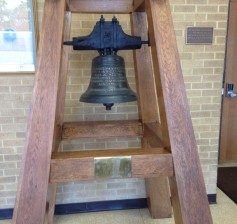Though the United States officially earned its independence in the bloody American Revolutionary War, fought for more than eight years (1775-1783), in reality, any national sovereignty the young Republic enjoyed was fragile at best. The British government routinely kidnapped American sailors on the high seas, introduced burdensome trade restrictions against the former colony and insulted the infant-country’s national honor at every turn.
In June 1807 tensions between the two countries reached a tipping point off the coast of Virginia when a Royal Navy ship, HMS Leopard, attacked the USS Chesapeake in American waters, killing three crewmembers and wounding an additional 18 – after a short skirmish, British sailors boarded the American vessel and captured four crewmembers they accused of having deserted the Royal Navy, one of which they ultimately hanged. The incident created outrage throughout America, as citizens demanded the Federal government to take action.
Over the next five years, relations between the two countries grew even colder.
In June 1812 President James Madison, a Virginian, sent a message to Congress recounting American grievances against Great Britain. The House of Representatives deliberated for four days behind closed doors before voting 79 to 49 to declare war, the Senate agreed by a margin of 19 to 13.
The war, which is often referred to as America’s Second War for Independence, drug on for two years and eight months and ultimately ended with no significant change in boundaries and could best be described as a stalemate (The British had burned America’s capital, while the U.S. had successfully invaded parts of British-Canada and defeated the English in dramatic fashion at the Battle of New Orleans).
Though neither side could claim total victory from the conflict, the war is credited with securing additional sovereignty for America, eliminating the threat of future war with England and the young country scored enough victories to satisfy its honor.
Among the many battles of the war was the Battle of Lake Erie, which occurred on September 10, 1813, near Put-in-Bay, Ohio. The naval skirmish resulted in a decisive American victory, which culminated with the defeat and capture of six British Royal Navy vessels. This ensured American control of the lake for the remainder of the war, which in turn allowed the United States to recover Detroit.
Though most of the captured British ships were reconditioned for battle as American naval ships, others were eventually dismantled and destroyed.
Among the many prizes of war, was an iron bell that had been cast in Germany and used aboard an English warship.
The bell bore a German inscription, which being translated is:
“The Welfare of the Ship, The Lady Elizabeth. For the Sirs Casper, Voigt & Co., Captain Daniel Joachim Rohlap, Anno 1781. ‘Me’ Ioh’ Iven’ in Hamburg.”
Following the war’s end, Southwest Virginia attorney Alexander Smyth, who had served as a commander of American forces along the Great Lakes region, returned to his home in Wythe County and presented the bell to county residents as a gift.
The bell was placed upon the county’s courthouse where it served as the county’s bell for nearly a century.
On January 26, 1900, the Wythe County Board of Supervisors voted against spending any additional money to make further repairs to the aging building, deciding instead to commission the construction a new county courthouse.
The new government-seat was designed by famed architect Frank P. Milburn, whose resume included the South Carolina State House and Florida Capitol Building.
In August, the county obtained a parcel of land along Fourth Street and construction began on the new building, with J.E. Parrish serving as the builder.
In July 1915, the Stuart Chapter of the Daughters of the American Revolution presented the county with a wooden structure suitable for mounting the historic bell – ensuring its safe preservation for future generations.
Today, the bell stands in a hallway just outside of the Wythe County Clerk of the Court’s office – flanking the bell is a framed history briefly describing the county bell’s journey from Hamburg, Germany, to England, to the Great Lakes, to Wythe County, Virginia.
Click LIKE to share this article with your friends on Facebook!
